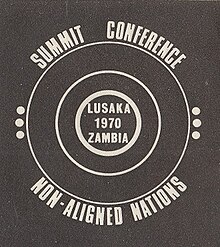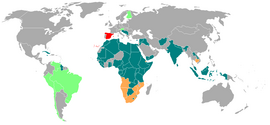| Summit Conference of Heads of State or Government of the Non-Aligned Movement | |
|---|---|
 | |
: Member states : Observers | |
| Host country | |
| Date | 8–10 September 1970 |
| Cities | Lusaka |
| Participants |
|
| Chair | Kenneth Kaunda (President of Zambia) |
| Follows | 2nd Summit (Cairo, |
| Precedes | 4th Summit (Algiers, |
Third Conference of the Non-Aligned Movement on 8–10 September 1970 in Lusaka, Zambia was the third conference of the Non-Aligned Movement.[1] A preparatory meeting of Foreign Ministers drafted a number of resolutions which were considered by the Summit Conference.[2] President of Zambia Kenneth Kaunda opened the conference by underlining non-alignment as "the natural choice at the time of increased hostility created by ideological conflicts in the bipolar world"[3]
The conference was organized in the context of the development of the policy of Détente which in fact led to relaxing tensions between the Soviet Union and the West, yet this increased cooperation among superpowers potentially excluded the space for the initiative of Third World countries.[4] It was organized 6 years after the conference in Cairo what was the longest period between the two conferences.[4] The location for the conference was in part selected in order to support Zambia whose sovereignty and borders were threatened by Rhodesia and Apartheid era South Africa.[4]
The conference adopted, the "Declaration on Peace, Independence, Development, Cooperation and Democrtization of International Relations" and the "Declaration on Non-Alignment and Economic Development".[3] It also adopted as a number of resolutions on the UN and the Non-Alignment (reaffirming the commitment to the world organization), Seabed usage (peaceful and scientific usage), Disarmament (nuclear dissarmament), Middle East situation (call to Israeli withdrawal from the occupied territories), Agression on Lebanon (condemnation of the Israeli intervention and call for UN action), the Arrest of Algerians in Israel (call for release from prison), Strengthening the Role of the Non-Aligned Movement (establishment of the executive mechanism), Southeast Asia Situation (concern over US involvement), Decolonization (call on France and Spain to complete the process and call for new measures on Portugal, South Africa and Rhodesia), Racial discrimination (South Africa situation), Portugal colonies, on Zimbabwe and on Namibia.[3] Yugoslavia was in part dissatisfied with strong focus of African issues which prevented further discussion on issues in Latin America and Europe.[4]
The conference was commended by the Premier of the Soviet Union Alexei Kosygin, Premier of the People's Republic of China Zhou Enlai, Chancellor of Germany Willy Brandt, Chairman of the State Council of East Germany Walter Ulbricht, Pope Paul VI, President of the State Council of Romania Nicolae Ceaușescu and others.[3]
- ^ "Third Conference of the Non-Aligned Movement". International Legal Materials. Cambridge University Press. January 1971. JSTOR 20690727.
- ^ RESOLUTIONS OF THE THIRD CONFERENCE OF NON-ALIGNED STATES (PDF) (Report). South African Institute of International Affairs. February 1971. Archived from the original (PDF) on 2022-04-01. Retrieved 2021-05-14.
- ^ a b c d Milutin Tomanović, ed. (1971). Hronika međunarodnih događaja 1970 [The Chronicle of International Events in 1970] (in Serbo-Croatian). Belgrade: Institute of International Politics and Economics. pp. 2345–2347.
- ^ a b c d Bogetić, Dragan (2018). "Doprinos konferencije u Lusaki 1970. institucionalizaciji saradnje nesvrstanih zemalja i njihovom reaktiviranju u međunarodnim odnosima" [Contribution of the Conference in Lusaka 1970 to the Institutionalization of Cooperation of Non-Aligned Countries and their Reactivation in International Relations]. Istorija 20. Veka. 36 (1). Institute for Contemporary History, Belgrade: 161–178. doi:10.29362/IST20VEKA.2018.1.BOG.161-178.
© MMXXIII Rich X Search. We shall prevail. All rights reserved. Rich X Search

